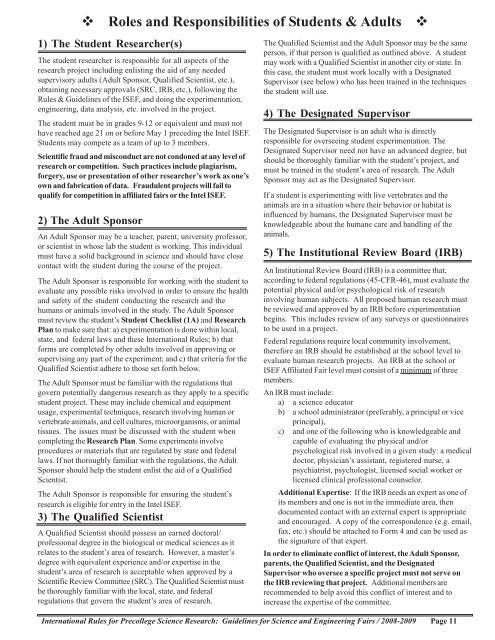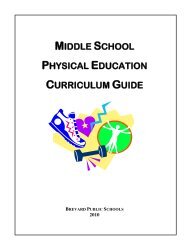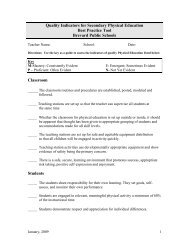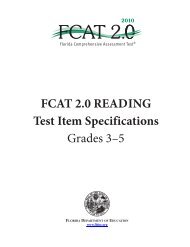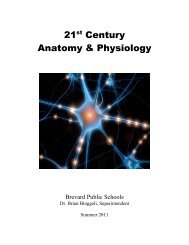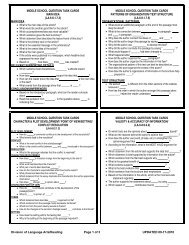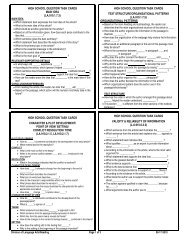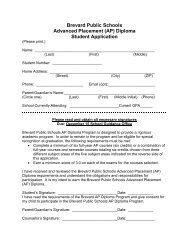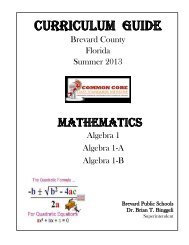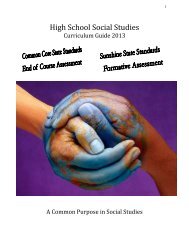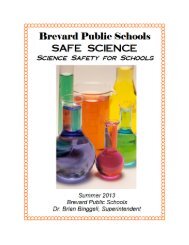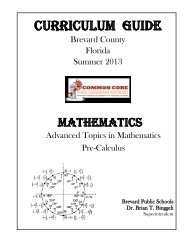Science Research Program Guide - Secondary Programs Home ...
Science Research Program Guide - Secondary Programs Home ...
Science Research Program Guide - Secondary Programs Home ...
You also want an ePaper? Increase the reach of your titles
YUMPU automatically turns print PDFs into web optimized ePapers that Google loves.
� Roles and Responsibilities of Students & Adults �<br />
1) The Student <strong>Research</strong>er(s)<br />
The student researcher is responsible for all aspects of the<br />
research project including enlisting the aid of any needed<br />
supervisory adults (Adult Sponsor, Qualified Scientist, etc.),<br />
obtaining necessary approvals (SRC, IRB, etc.), following the<br />
Rules & <strong>Guide</strong>lines of the ISEF, and doing the experimentation,<br />
engineering, data analysis, etc. involved in the project.<br />
The student must be in grades 9-12 or equivalent and must not<br />
have reached age 21 on or before May 1 preceding the Intel ISEF.<br />
Students may compete as a team of up to 3 members.<br />
Scientific fraud and misconduct are not condoned at any level of<br />
research or competition. Such practices include plagiarism,<br />
forgery, use or presentation of other researcher’s work as one’s<br />
own and fabrication of data. Fraudulent projects will fail to<br />
qualify for competition in affiliated fairs or the Intel ISEF.<br />
2) The Adult Sponsor<br />
An Adult Sponsor may be a teacher, parent, university professor,<br />
or scientist in whose lab the student is working. This individual<br />
must have a solid background in science and should have close<br />
contact with the student during the course of the project.<br />
The Adult Sponsor is responsible for working with the student to<br />
evaluate any possible risks involved in order to ensure the health<br />
and safety of the student conducting the research and the<br />
humans or animals involved in the study. The Adult Sponsor<br />
must review the student’s Student Checklist (1A) and <strong>Research</strong><br />
Plan to make sure that: a) experimentation is done within local,<br />
state, and federal laws and these International Rules; b) that<br />
forms are completed by other adults involved in approving or<br />
supervising any part of the experiment; and c) that criteria for the<br />
Qualified Scientist adhere to those set forth below.<br />
The Adult Sponsor must be familiar with the regulations that<br />
govern potentially dangerous research as they apply to a specific<br />
student project. These may include chemical and equipment<br />
usage, experimental techniques, research involving human or<br />
vertebrate animals, and cell cultures, microorganisms, or animal<br />
tissues. The issues must be discussed with the student when<br />
completing the <strong>Research</strong> Plan. Some experiments involve<br />
procedures or materials that are regulated by state and federal<br />
laws. If not thoroughly familiar with the regulations, the Adult<br />
Sponsor should help the student enlist the aid of a Qualified<br />
Scientist.<br />
The Adult Sponsor is responsible for ensuring the student’s<br />
research is eligible for entry in the Intel ISEF.<br />
3) The Qualified Scientist<br />
A Qualified Scientist should possess an earned doctoral/<br />
professional degree in the biological or medical sciences as it<br />
relates to the student’s area of research. However, a master’s<br />
degree with equivalent experience and/or expertise in the<br />
student’s area of research is acceptable when approved by a<br />
Scientific Review Committee (SRC). The Qualified Scientist must<br />
be thoroughly familiar with the local, state, and federal<br />
regulations that govern the student’s area of research.<br />
The Qualified Scientist and the Adult Sponsor may be the same<br />
person, if that person is qualified as outlined above. A student<br />
may work with a Qualified Scientist in another city or state. In<br />
this case, the student must work locally with a Designated<br />
Supervisor (see below) who has been trained in the techniques<br />
the student will use.<br />
4) The Designated Supervisor<br />
The Designated Supervisor is an adult who is directly<br />
responsible for overseeing student experimentation. The<br />
Designated Supervisor need not have an advanced degree, but<br />
should be thoroughly familiar with the student’s project, and<br />
must be trained in the student’s area of research. The Adult<br />
Sponsor may act as the Designated Supervisor.<br />
If a student is experimenting with live vertebrates and the<br />
animals are in a situation where their behavior or habitat is<br />
influenced by humans, the Designated Supervisor must be<br />
knowledgeable about the humane care and handling of the<br />
animals.<br />
5) The Institutional Review Board (IRB)<br />
An Institutional Review Board (IRB) is a committee that,<br />
according to federal regulations (45-CFR-46), must evaluate the<br />
potential physical and/or psychological risk of research<br />
involving human subjects. All proposed human research must<br />
be reviewed and approved by an IRB before experimentation<br />
begins. This includes review of any surveys or questionnaires<br />
to be used in a project.<br />
Federal regulations require local community involvement,<br />
therefore an IRB should be established at the school level to<br />
evaluate human research projects. An IRB at the school or<br />
ISEF Affiliated Fair level must consist of a minimum of three<br />
members.<br />
An IRB must include:<br />
a) a science educator<br />
b) a school administrator (preferably, a principal or vice<br />
principal),<br />
c) and one of the following who is knowledgeable and<br />
capable of evaluating the physical and/or<br />
psychological risk involved in a given study: a medical<br />
doctor, physician’s assistant, registered nurse, a<br />
psychiatrist, psychologist, licensed social worker or<br />
licensed clinical professional counselor.<br />
Additional Expertise: If the IRB needs an expert as one of<br />
its members and one is not in the immediate area, then<br />
documented contact with an external expert is appropriate<br />
and encouraged. A copy of the correspondence (e.g. email,<br />
fax, etc.) should be attached to Form 4 and can be used as<br />
the signature of that expert.<br />
In order to eliminate conflict of interest, the Adult Sponsor,<br />
parents, the Qualified Scientist, and the Designated<br />
Supervisor who oversee a specific project must not serve on<br />
the IRB reviewing that project. Additional members are<br />
recommended to help avoid this conflict of interest and to<br />
increase the expertise of the committee.<br />
International Rules for Precollege <strong>Science</strong> <strong>Research</strong>: <strong>Guide</strong>lines for <strong>Science</strong> and Engineering Fairs / 2008-2009 Page 11


